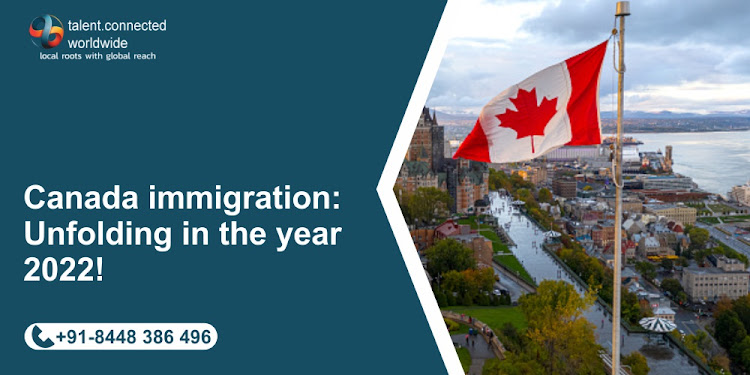Every month, the IRCC completes about 14,000 CEC applications and less than 600 FSWP applications
According to new IRCC data, the Department of Homeland Security is currently prioritising Express Entry applications. Canada immigration consultants in Delhi are there to help you with this.
The
figures show the number of permanent residence applications approved by
Immigration, Refugees and Citizenship Canada under the Express Entry programme.
Express
Entry is the primary pathway for economic-class skilled immigrants to enter
Canada. Candidates who fit the requirements of an Express Entry programme can
register on the IRCC website and submit their profile.
The
Comprehensive Ranking System (CRS) assigns a score to candidates based on human
capital factors like age, education, language skills, and work experience. IRCC
invites the highest-scoring individuals to apply for permanent residency every
two weeks. After that, they have 60 days to submit an application to IRCC for
permanent residence.
A
candidate obtains a Confirmation of Permanent Residence (COPR) whenever IRCC
approves their application, allowing them to officially land in Canada as a
permanent resident. A COPR holder who was previously resided in Canada as a temporary
resident may be able to convert their legal status to permanent residency as
part of the landing procedure. It can also refer to a person arriving from
another country with their COPR in order to become a permanent resident.
In
the wake of the epidemic, the IRCC has made significant revisions to its
Express Entry policies. This year, the agency is working on a plan to bring in
401,000 new permanent residents. It decided to focus on transferring more
temporary residents to permanent residence at the start of 2021 in order to
have a greater chance of meeting its 401,000 immigrant objective.
As
a result, under Express Entry this year, it has exclusively welcomed candidates
from the Canadian Experience Class (CEC) and the Provincial Nominee Program
(PNP). This is a significant break from previous practise, as the Federal
Skilled Worker Program (FSWP) accounted for over half of all successful Express
Entry applicants prior to the epidemic. The IRCC has implemented this policy
change for two reasons.
For
starters, it claims that because 90% of CEC candidates are currently residing
in Canada during the pandemic, they are less likely to experience COVID-related
delays that would prevent them from completing their permanent residency
landings in 2021. Second, the IRCC continues to invite PNP candidates to assist
provinces in meeting their labour market needs around the country. You can get
more advice on the same, with the help of Canada
immigration consultants in Delhi.
Another
consequence of this adjustment is that, instead of inviting the highest-ranking
candidates from the whole Express Entry pool, as it did before the epidemic,
IRCC has instead invited the highest-ranking CEC and PNP candidates. Because
the government wanted to invite as many CEC candidates as possible to support
its immigration target for this year, overall CRS cut-off scores have
decreased. On February 13, the most significant draw of the year occurred when
IRCC invited 27,332 CEC candidates to apply for permanent residence, a feat
accomplished by setting the CRS cut-off score at just 75.
To
put this in context, this draw was approximately six times larger than the
previous high (Express Entry has been in place since 2015), and the cut-off
score was nearly 400 points lower than it was before the pandemic.
FSWP
candidates are the ones who suffer the most. Only 6,795 COPRs were awarded to
them this year. This represents barely 5% of all COPRs awarded to Express Entry
candidates this year, a figure that is nearly 9 times lower than before the
pandemic.
Source:
IRCC
Through
May, IRCC had a poor start to the year, completing between 7,000 and 10,000
Express Entry applications every month. This nearly quadrupled in June, and
IRCC has continued to process Express Entry applications at a high rate in the
second half of this year. Candidates for CECs will benefit the most from the
enhanced processing capacity.
IRCC
has also raised the amount of PNP applications it is finalising, but it is
still far below the number of PNP candidates it handled in January. The data
implies that, in order to meet its 401,000 newcomer objective, IRCC has shifted
its resources to processing as many CEC applications as possible.
The
amount of FSWP applications handled has not improved significantly. In each of
the months of September and October, IRCC completed over 600 FSWP applications.
According
to the IRCC, there are now 1.8 million permanent and temporary residency
applications on hold. As of October 27, there were just fewer than 100,000
Express Entry applications. By January 2022, IRCC will have processed all of
the remaining 48,000 CEC applications, assuming it keeps up its current pace.
Before considering resuming invitations to CEC and FSWP candidates, the
department has stated that it would like to reduce its Express Entry inventory
by more than half. This year, the IRCC held 27 CEC draws, but they have been on
hold since September 14.
IRCC
is on track to meet its immigration objective for this year. It has landed
about 314,000 permanent residents as of October, and has been averaging over
45,000 each month in recent months. The department is presently deciding on
Canada's immigration objective for 2022, as well as which Express Entry
approach to pursue the following year. In the next months, we may expect to learn
more. The issue of mandate letters to each federal minister, including
immigration minister Sean Fraser, is one of the major announcements still to
come.
In
addition, on February 10th, Fraser will present Canada's Immigration Levels
Plan 2023-2025. The mandate letter and new levels plan will provide further
clarity on IRCC's policy priorities in 2022 and beyond to stakeholders.
You
can get more insights on the same, with the help of Canada PR agency.




Comments
Post a Comment